An aid mission to two hospitals in northern Gaza has found horrifying scenes of children dying of starvation, amid dire shortages of food, fuel and medicines, the World Health Organization has said.
WHO chief Tedros Adhanom Ghebreyesus said the agency's visits over the weekend to the Al-Awda and Kamal Adwan hospitals "were the first since early October 2023, despite our efforts to gain more regular access to the north of Gaza".
The findings were "grim", he said on X, adding that "the situation at Al-Awda was particularly appalling, as one of the buildings is destroyed".
The Kamal Adwan hospital, the only paediatrics hospital in northern Gaza, was overwhelmed with patients, he said.
"The lack of food resulted in the deaths of ten children," Mr Tedros said.
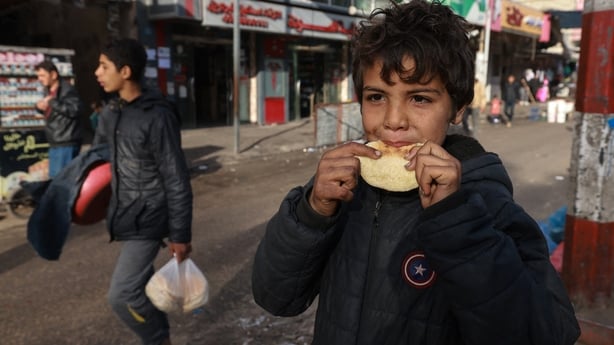
In all, the Gaza health ministry has said at least 16 children have died of malnutrition in aid-deprived northern Gaza.
The United Nations warned last week that famine in Gaza was "almost inevitable" because of the war that has been raging in the Palestinian territory since Hamas militants carried out an unprecedented attack inside Israel on 7 October.
That attack resulted in the deaths of about 1,160 people, mostly civilians, according to an AFP tally of official figures.
It also saw the militants abduct 250 hostages, of whom 130 remain in captivity, including 31 presumed dead, according to Israel.
Israel's retaliatory offensive against the Palestinian territory has killed more than 30,500 people, mostly women and children, according to the health ministry in Gaza.
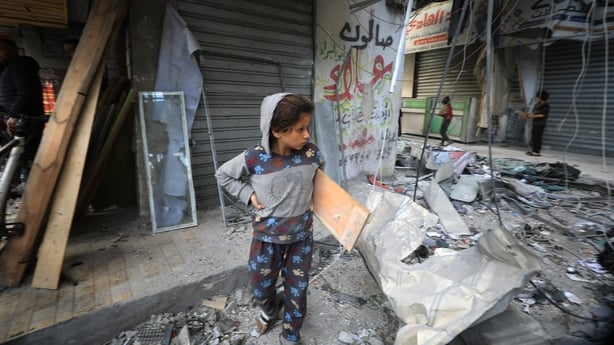
In addition to the dire lack of food at the two northern hospitals, Mr Tedros also cautioned on X that "the lack of electricity poses a serious threat to patient care, especially in critical areas like the intensive care unit and the neonatal unit".
During the weekend mission, the UN health agency delivered 9,500 litres of fuel to each hospital, along with some essential medical supplies, he said.
"This is a fraction of the urgent lifesaving needs."
Mr Tedros reiterated an appeal to Israel to "ensure humanitarian aid can be delivered safely, and regularly".
"Civilians, especially children, and health staff need scaled-up help immediately," he said, stressing though that "the key medicine all these patients need is peace. Ceasefire."
Hamas 'unsure' how many hostages are alive in Gaza
A Hamas leader has said that the Palestinian movement doesn't know how many of the hostages taken to Gaza in its 7 October attack on Israel are still alive.
"Of the prisoners, we don't know exactly who among them are alive or dead, killed because of strikes or hunger," Bassem Naim, a senior Hamas leader, told AFP from Cairo in Egypt.
"There are prisoners held by numerous groups in multiple places" across the Palestinian territory, he said, nearly five months into the war between Hamas and Israel.
Mr Naim, a former health minister in Gaza, said that "a ceasefire is necessary so that we can carry out (checks) on this issue...regarding the names, numbers and their status whether alive or dead."
The issue of hostages is central to the ongoing negotiations in Cairo for a truce in Gaza.
Qatari and Egyptian mediators were engaged in discussions with United States and Hamas envoys for the second day of talks today.
Israel's government has refused to send its delegation to the Cairo talks, stating they had not been given a list of living hostages by Hamas, according to Israeli media reports.
Mr Naim, however, said that details on the status of the prisoners "were not mentioned in any documents or proposals circulated during the negotiation process".
Around 250 hostages were taken to Gaza during the 7 October attack, and Israeli officials say 130 captives are still being held there, including 31 presumed dead.
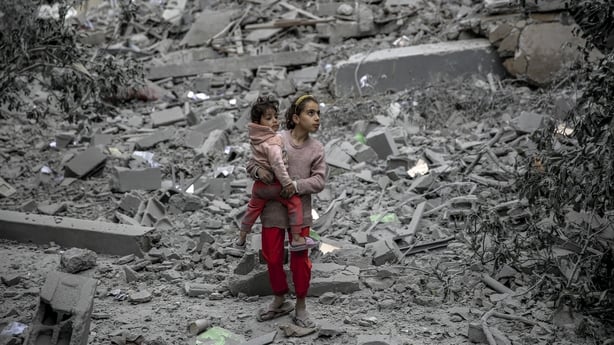
On Friday, Hamas said that seven more hostages seized during its attack had died because of Israeli military operations in Gaza. AFP could not independently confirm the information.
In December, Israel's military announced that soldiers killed three hostages by mistake, believing they posed a threat.
Rafah strike kills family
Palestinian authorities say more than 30,000 people have been confirmed killed, with thousands of other bodies unrecovered. Most of the population has been made homeless, and the United Nations says hundreds of thousands of people face famine.
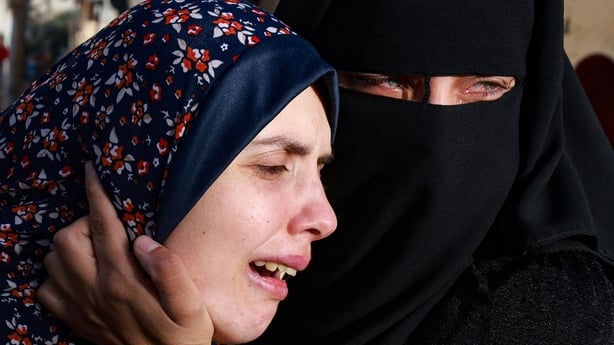
An agreement to halt fighting by Ramadan would effectively head off a threatened Israeli assault on Rafah, the last town on the southern edge of Gaza, where more than half of the enclave's population are now sheltering, mostly in makeshift tents.
The final days leading up to that deadline have been particularly bloody. Residents have described heavy fighting since Saturday just north of Rafah in Khan Younis, the main southern city, where Israeli forces have released video showing buildings obliterated in airstrikes.
In Rafah itself, airstrikes on homes have been killing families nightly as they sleep. At least 14 corpses of a family killed overnight were laid out at a hospital morgue in Rafah this morning. One of the body bags was partially unzipped so weeping relatives could stroke the hair of a dead child.
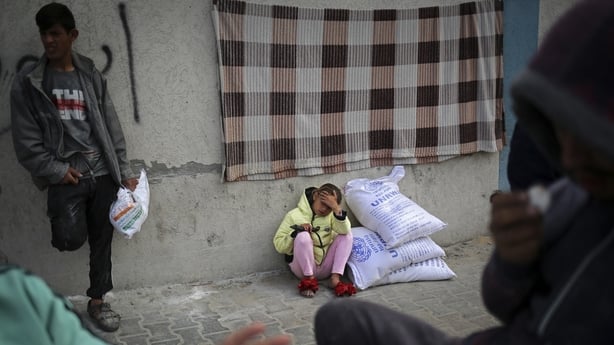
Israel's Channel 14 News reported that several officers in the Israel Defence Forces (IDF) spokesperson's unit were leaving their jobs, including chief international spokesperson Lieutenant-Colonel Richard Hecht.
It said the large number leaving at once at a time of war was unusual.
Read more: Latest Middle East stories
The military denied media reports that chief spokesperson Rear-Admiral Daniel Hagari had resigned, but did not directly comment on reports of other officers leaving the unit.
"The IDF Spokesperson's Unit continues to fulfil its mission of sharing the truth with transparency and accuracy, while countering misinformation - including baseless claims such as these," it said in a statement.

